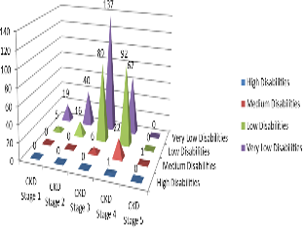Abstract
The chronic kidney disease (CKD) co-exist with hypertension in approximately 80 to 85 per cent of patients. The CKD stages can be defined by glomerular filtration rate (GFR), and the deterioration of kidney function or reduction in GFR has observed in those with uncontrolled blood pressure (BP). We had conducted a prospective study to analyse the impact of the angiotensin system-related agents on the quality of life of CKD patients with hypertension. The SF-36 questionnaire, direct patients interview and medical records were the sources for retrieval of information. We observed that male patients were more prone to CKD than female. Hypertension was the primary (77.8%) aetiology behind the incidence of CKD. The angiotensin-converting enzyme inhibitors (ACEI) was responsible for very low (58%) and low (44%) health disabilities to the patients. In contrast, the angiotensin receptor blockers (ARB) even though it has a limited adverse effect, the patients complained of medium (9%) and high disabilities than the ACEIs. The discontinuation of the antihypertensive drugs by the CKD patients was almost negligible (3.4%). The study concludes that a balanced diet and reasonable blood pressure control is essential to prevent the progression of CKD and to improve the quality of life.
Full text article
Authors

This work is licensed under a Creative Commons Attribution-NonCommercial-NoDerivatives 4.0 International License.

